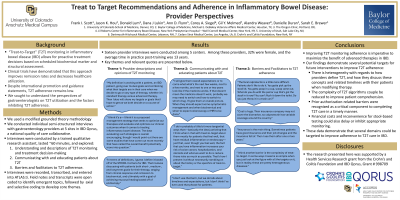Tuesday Poster Session
Category: IBD
P4362 - Treat to Target Recommendations and Adherence in Inflammatory Bowel Disease: Provider Perspectives
Tuesday, October 29, 2024
10:30 AM - 4:00 PM ET
Location: Exhibit Hall E

Has Audio

Frank I. Scott, MD, MSc(Epi)
University of Colorado Anschutz Medical Campus
Aurora, CO
Presenting Author(s)
Frank I.. Scott, MD, MSc(Epi)1, Jason K. Hou, MD, MS, FACG2, Donald Lum, MD, FACG3, Dana J. Lukin, MD4, Ann D. Flynn, MD, FACG5, Corey A.. Siegel, MD, MS6, Gil Y. Melmed, MD7, Alandra Weaver, MPH8, Danielle Duran, MA9, Sarah E. Brewer, PhD, MPA1
1University of Colorado Anschutz Medical Campus, Aurora, CO; 2Baylor College of Medicine / Michael E. DeBakey Veterans Affairs Medical Center, Houston, TX; 3The Oregon Clinic, Portland, OR; 4Jill Roberts Center for Inflammatory Bowel Disease, New York Presbyterian Hospital-Weill Cornell Medicine, New York, NY; 5University of Utah, Salt Lake City, UT; 6Dartmouth-Hitchcock Medical Center, Lebanon, NH; 7Cedars-Sinai Medical Center, Los Angeles, CA; 8Crohn's and Colitis Foundation, New York, NY; 9University of Colorado School of Medicine, Aurora, CO
Introduction: “Treat-to-Target” (T2T) monitoring in inflammatory bowel disease (IBD) allows for proactive treatment decisions based on scheduled biochemical marker and structural assessment. Clinical trials have demonstrated that this approach improves remission rates and decreases healthcare utilization. However, despite international promotion and guidance statements such as STRIDE, T2T adherence remains low. We sought to understand the perspectives of gastroenterologists on T2T utilization and the factors inhibiting T2T adherence.
Methods: Using a modified grounded theory methodology, we conducted individual semi-structured interviews with gastroenterology providers at 5 sites in IBD Qorus, a national quality of care collaborative supported by the Crohn’s and Colitis Foundation. Interviews were conducted by a trained qualitative research assistant, lasted ~60 minutes, and explored understanding and descriptions of T2T monitoring and treatment decision-making, communicating with and educating patients about T2T, and barriers and facilitators to T2T adherence. Interviews were recorded, transcribed, and entered into ATLAS.ti. We mined field notes and reviewed transcripts to identify emergent topics, conducted open coding, then used axial and selective coding to develop categories. Data were synthesized into core themes.
Results: Participating providers (n=16) were 32% female, represented 5 states, and averaged 13 years in practice. Analyses revealed four main themes influencing T2T adherence: 1) T2T was not fully understood by providers and many equated constructs with other STRIDE guidelines; 2) provider perceptions of the correct timing of biochemical and/or structural monitoring were not homogenous; 3) insurance and prior authorizations significantly delay or prevent treatment and 4) clinical remission is the top priority, while biochemical and structural remission are supplemental goals.
Discussion: Our findings, derived from interviews with gastroenterologists with a focus on IBD-related care, indicate opportunities to improve T2T adherence through more direct guidelines on implementing T2T monitoring in practice. Additionally, directives on mindfully incorporating T2T monitoring, incorporating patient preferences and maximizing feasibility will promote adherence. Because insurance and prior authorization can act as a barrier to treatment initiation, improved approval processes would help to decrease delays in patient care and decrease healthcare utilization.
Note: The table for this abstract can be viewed in the ePoster Gallery section of the ACG 2024 ePoster Site or in The American Journal of Gastroenterology's abstract supplement issue, both of which will be available starting October 27, 2024.
Disclosures:
Frank I.. Scott, MD, MSc(Epi)1, Jason K. Hou, MD, MS, FACG2, Donald Lum, MD, FACG3, Dana J. Lukin, MD4, Ann D. Flynn, MD, FACG5, Corey A.. Siegel, MD, MS6, Gil Y. Melmed, MD7, Alandra Weaver, MPH8, Danielle Duran, MA9, Sarah E. Brewer, PhD, MPA1. P4362 - Treat to Target Recommendations and Adherence in Inflammatory Bowel Disease: Provider Perspectives, ACG 2024 Annual Scientific Meeting Abstracts. Philadelphia, PA: American College of Gastroenterology.
1University of Colorado Anschutz Medical Campus, Aurora, CO; 2Baylor College of Medicine / Michael E. DeBakey Veterans Affairs Medical Center, Houston, TX; 3The Oregon Clinic, Portland, OR; 4Jill Roberts Center for Inflammatory Bowel Disease, New York Presbyterian Hospital-Weill Cornell Medicine, New York, NY; 5University of Utah, Salt Lake City, UT; 6Dartmouth-Hitchcock Medical Center, Lebanon, NH; 7Cedars-Sinai Medical Center, Los Angeles, CA; 8Crohn's and Colitis Foundation, New York, NY; 9University of Colorado School of Medicine, Aurora, CO
Introduction: “Treat-to-Target” (T2T) monitoring in inflammatory bowel disease (IBD) allows for proactive treatment decisions based on scheduled biochemical marker and structural assessment. Clinical trials have demonstrated that this approach improves remission rates and decreases healthcare utilization. However, despite international promotion and guidance statements such as STRIDE, T2T adherence remains low. We sought to understand the perspectives of gastroenterologists on T2T utilization and the factors inhibiting T2T adherence.
Methods: Using a modified grounded theory methodology, we conducted individual semi-structured interviews with gastroenterology providers at 5 sites in IBD Qorus, a national quality of care collaborative supported by the Crohn’s and Colitis Foundation. Interviews were conducted by a trained qualitative research assistant, lasted ~60 minutes, and explored understanding and descriptions of T2T monitoring and treatment decision-making, communicating with and educating patients about T2T, and barriers and facilitators to T2T adherence. Interviews were recorded, transcribed, and entered into ATLAS.ti. We mined field notes and reviewed transcripts to identify emergent topics, conducted open coding, then used axial and selective coding to develop categories. Data were synthesized into core themes.
Results: Participating providers (n=16) were 32% female, represented 5 states, and averaged 13 years in practice. Analyses revealed four main themes influencing T2T adherence: 1) T2T was not fully understood by providers and many equated constructs with other STRIDE guidelines; 2) provider perceptions of the correct timing of biochemical and/or structural monitoring were not homogenous; 3) insurance and prior authorizations significantly delay or prevent treatment and 4) clinical remission is the top priority, while biochemical and structural remission are supplemental goals.
Discussion: Our findings, derived from interviews with gastroenterologists with a focus on IBD-related care, indicate opportunities to improve T2T adherence through more direct guidelines on implementing T2T monitoring in practice. Additionally, directives on mindfully incorporating T2T monitoring, incorporating patient preferences and maximizing feasibility will promote adherence. Because insurance and prior authorization can act as a barrier to treatment initiation, improved approval processes would help to decrease delays in patient care and decrease healthcare utilization.
Note: The table for this abstract can be viewed in the ePoster Gallery section of the ACG 2024 ePoster Site or in The American Journal of Gastroenterology's abstract supplement issue, both of which will be available starting October 27, 2024.
Disclosures:
Frank Scott: Crohn's and Colitis Foundation – Grant/Research Support. Takeda Pharmaceuticals – Grant/Research Support.
Jason Hou: Abbvie – Grant/Research Support. American Regent – Grant/Research Support. Bristol Myers Squibb – Grant/Research Support. Eli-Lilly – Advisor or Review Panel Member, Grant/Research Support. Janssen – Grant/Research Support. Pfizer – Grant/Research Support. Vedanta – Grant/Research Support.
Donald Lum: Abbvie – Consultant, Speakers Bureau. Janssen – Speakers Bureau. Lilly – Advisor or Review Panel Member.
Dana J. Lukin: AbbVie – Consultant, Grant/Research Support, Speakers Bureau. AltruBio – Consultant. Boehringer Ingelheim – Consultant, Grant/Research Support. Bristol Myers Squibb – Consultant. Eli Lilly – Consultant. Fresenius Kabi – Consultant. Janssen – Consultant, Grant/Research Support, Speakers Bureau. Magellan Health – Consultant. Palatin Technologies – Consultant. Pfizer – Consultant. Prometheus Laboratories – Consultant. PSI – Consultant. Takeda – Consultant, Grant/Research Support.
Ann Flynn: Abbvie – Advisory Committee/Board Member.
Corey Siegel: Abbvie – Advisory Committee/Board Member, Consultant, Grant/Research Support, Speaker for CME activities. BMS – Advisory Committee/Board Member, Consultant. Boomerang – Advisory Committee/Board Member, Consultant. Buhlman – Advisory Committee/Board Member, Consultant. Janssen – Advisory Committee/Board Member, Consultant, Grant/Research Support, Speaker for CME activities. Lilly – Advisory Committee/Board Member, Consultant. Napo pharmaceuticals – Advisory Committee/Board Member, Consultant. Pfizer – Advisory Committee/Board Member, Consultant, Grant/Research Support, speaker for CME activities. Prometheus Biosciences – Advisory Committee/Board Member, Consultant. Prometheus Labs – Advisory Committee/Board Member, Consultant. Roivant – Advisory Committee/Board Member, Consultant. Takeda – Advisory Committee/Board Member, Consultant, Grant/Research Support, speaker for CME activities. Trellus Health – Advisory Committee/Board Member, Consultant.
Gil Y. Melmed: AbbVie – Consultant. Arena Biopharmaceuticals – Consultant. Boehringer-Ingelheim – Consultant. Bristol Myers Squibb-Celgene – Consultant. Dieta – Consultant. Eli Lilly – Consultant. Ferring – Consultant. Fresenius Kabi – Consultant. Genentech – Consultant. Gilead – Consultant. Janssen Immunology – Consultant. Oshi Health – Consultant. Pfizer – Consultant, Grant/Research Support. Prometheus Labs – Consultant. Samsung Bioepis – Consultant. Shionogi – Consultant. Takeda – Consultant. Techlab – Consultant. Viatris – Consultant.
Alandra Weaver indicated no relevant financial relationships.
Danielle Duran indicated no relevant financial relationships.
Sarah Brewer: Abbott Laboratories – Stock-publicly held company(excluding mutual/index funds). Agilent Technologies – Stock-publicly held company(excluding mutual/index funds). Amgen Inc – Stock-publicly held company(excluding mutual/index funds). Biogen Idec, Inc – Stock-publicly held company(excluding mutual/index funds). Eli Lilly and Company – Stock-publicly held company(excluding mutual/index funds). Gilead Sciences Inc – Stock-publicly held company(excluding mutual/index funds). Merck & Co, Inc – Advisory Committee/Board Member, Stock-publicly held company(excluding mutual/index funds). Pfizer, Inc – Stock-publicly held company(excluding mutual/index funds). Quest Diagnostics – Stock-publicly held company(excluding mutual/index funds). Thermo Fisher Scientific – Stock-publicly held company(excluding mutual/index funds).
Frank I.. Scott, MD, MSc(Epi)1, Jason K. Hou, MD, MS, FACG2, Donald Lum, MD, FACG3, Dana J. Lukin, MD4, Ann D. Flynn, MD, FACG5, Corey A.. Siegel, MD, MS6, Gil Y. Melmed, MD7, Alandra Weaver, MPH8, Danielle Duran, MA9, Sarah E. Brewer, PhD, MPA1. P4362 - Treat to Target Recommendations and Adherence in Inflammatory Bowel Disease: Provider Perspectives, ACG 2024 Annual Scientific Meeting Abstracts. Philadelphia, PA: American College of Gastroenterology.
